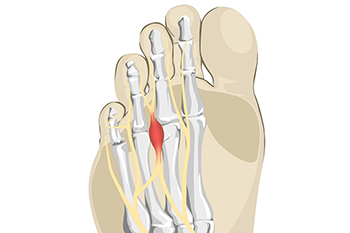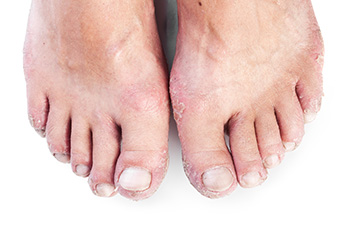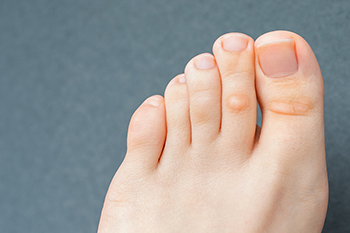Items filtered by date: December 2023
Arthritis Can Cause Pain in the Feet and Ankles
Recognizing Common Symptoms of Morton’s Neuroma

Morton's neuroma, a nerve disorder affecting the feet, brings forth a unique set of symptoms that can disrupt daily life. Characterized by the thickening of tissues around a nerve leading to the toes, this condition commonly presents as a sharp, burning pain in the ball of the foot. Individuals with Morton's neuroma may feel as if they are standing on a pebble or a fold in their sock. This discomfort often radiates into the toes, causing tingling or numbness. The pain tends to worsen with prolonged weight-bearing activities, such as walking or standing. Wearing tight shoes exacerbates symptoms, making proper footwear selection vital for those affected. It is not uncommon for individuals with Morton's neuroma to experience a feeling of relief when they remove their shoes. If you have one or more of the above symptoms, it is suggested that you speak with a podiatrist who can accurately diagnose and treat Morton’s neuroma.
Morton’s neuroma is a very uncomfortable condition to live with. If you think you have Morton’s neuroma, contact Philip Hahn, DPM of Advanced Foot & Ankle Center. Our doctor will attend to all of your foot care needs and answer any of your related questions.
Morton’s Neuroma
Morton's neuroma is a painful foot condition that commonly affects the areas between the second and third or third and fourth toe, although other areas of the foot are also susceptible. Morton’s neuroma is caused by an inflamed nerve in the foot that is being squeezed and aggravated by surrounding bones.
What Increases the Chances of Having Morton’s Neuroma?
- Ill-fitting high heels or shoes that add pressure to the toe or foot
- Jogging, running or any sport that involves constant impact to the foot
- Flat feet, bunions, and any other foot deformities
Morton’s neuroma is a very treatable condition. Orthotics and shoe inserts can often be used to alleviate the pain on the forefront of the feet. In more severe cases, corticosteroids can also be prescribed. In order to figure out the best treatment for your neuroma, it’s recommended to seek the care of a podiatrist who can diagnose your condition and provide different treatment options.
If you have any questions, please feel free to contact our office located in Texarkana, TX . We offer the newest diagnostic and treatment technologies for all your foot care needs.
Ways Psoriasis Affects the Feet

Psoriasis is a chronic autoimmune skin condition known for its distinctive red, scaly patches that commonly appear on various parts of the body. Unfortunately, psoriasis can also affect the feet, causing discomfort and complications. When psoriasis targets the feet, it can lead to symptoms such as redness, scaling, itching, and pain. The skin on the soles, toenails, and even between the toes can be affected. Psoriatic lesions on the feet can make walking and wearing shoes painful, significantly impacting one's quality of life. Moreover, psoriasis-related nail changes can lead to pitting, thickening, or even detachment of the toenails. Proper foot care and management strategies, such as topical treatments and lifestyle adjustments, can help alleviate the symptoms and improve the overall health of your feet. If you suspect psoriasis is affecting your feet, it is suggested that you schedule an appointment with a podiatrist who can provide you with an accurate diagnosis and personalized treatment plan.
When dealing with systemic disease of the feet, it is extremely important to check the affected areas routinely so that any additional problems are caught quickly. If you have any concerns about your feet and ankles contact Philip Hahn, DPM from Advanced Foot & Ankle Center. Our doctor will assist you with all of your podiatric needs.
Systemic Diseases of the Feet
Systemic diseases affect the whole body, and symptoms usually are displayed in the feet. This condition can make a patient’s ability to walk unbearable. Systemic diseases include gout, diabetes mellitus, neurological disorders, and arthritis.
Gout – is caused by an excess of uric acid in the body. Common symptoms include pain, inflammation, and redness at the metatarsal/phalangeal joint of the base big toe. Gout can be treated by NSAIDs to relieve pain and inflammation, and other drugs that lower the acid levels in the body.
Diabetes mellitus – is an increase in the level of blood sugar that the body cannot counteract with its own insulin. Failure to produce enough insulin is a factor in Diabetes.
Diabetes of the Feet
Diabetic Neuropathy – may lead to damaged nerves and affect the feet through numbness and loss of sensation.
Peripheral Vascular Disease – can restrict the blood flow to the feet, and often times lead to amputation of the feet.
If you have any questions please feel free to contact our office located in Texarkana, TX . We offer the newest diagnostic and treatment technologies for all your foot and ankle needs.
Foot Size Changes During Pregnancy

During pregnancy, many women experience changes in their bodies, including foot size growth. This phenomenon is primarily attributed to hormonal changes and increased fluid retention. The hormone relaxin, which helps to relax the ligaments in the pelvis for childbirth, can also affect the ligaments in the feet, leading to an increase in foot size. When it comes to addressing foot size changes during pregnancy, consulting a podiatrist can be beneficial. A podiatrist specializes in diagnosing and treating foot and ankle issues, in addition to providing guidance on managing foot discomfort and swelling during pregnancy. If you have foot-related concerns during pregnancy, it is suggested that you schedule an appointment with a podiatrist to ensure these issues are addressed promptly, increasing your health and well-being during this transformative period.
Pregnant women with swollen feet can be treated with a variety of different methods that are readily available. For more information about other cures for swollen feet during pregnancy, consult with Philip Hahn, DPM from Advanced Foot & Ankle Center. Our doctor will attend to all of your foot and ankle needs.
What Foot Problems Can Arise During Pregnancy?
One problem that can occur is overpronation, which occurs when the arch of the foot flattens and tends to roll inward. This can cause pain and discomfort in your heels while you’re walking or even just standing up, trying to support your baby.
Another problem is edema, or swelling in the extremities. This often affects the feet during pregnancy but tends to occur in the later stages.
How Can I Keep My Feet Healthy During Pregnancy?
- Wearing orthotics can provide extra support for the feet and help distribute weight evenly
- Minimize the amount of time spent walking barefoot
- Wear shoes with good arch support
- Wear shoes that allow for good circulation to the feet
- Elevate feet if you experience swelling
- Massage your feet
- Get regular, light exercise, such as walking, to promote blood circulation to the feet
If you have any questions please feel free to contact our office located in Texarkana, TX . We offer the newest diagnostic and treatment technologies for all your foot and ankle needs.
What Are the Common Causes of Corns on the Feet?

Corns, those small, often painful patches of thickened skin, are a common foot woe with various underlying causes. One frequent instigator is wearing ill-fitting footwear, particularly shoes that squeeze or rub against certain areas of the foot, creating friction and pressure. High heels, narrow shoes, or those with inadequate cushioning can contribute to the development of corns. Structural abnormalities, such as bunions or hammertoes, alter the distribution of weight on the feet, leading to increased friction and corn formation. Repetitive actions or activities that place excessive pressure on specific areas of the feet can also trigger corns. Additionally, individuals with gait abnormalities may be more prone to developing corns due to altered foot mechanics. Understanding these common causes allows for proactive measures, such as choosing proper footwear and addressing structural issues. If you have developed a corn on your foot, it is suggested that you visit a podiatrist who can treat it accordingly and offer appropriate prevention techniques.
If you have any concerns regarding your feet and ankles, contact Philip Hahn, DPM of Advanced Foot & Ankle Center. Our doctor will treat your foot and ankle needs.
Corns: What Are They? and How Do You Get Rid of Them?
Corns can be described as areas of the skin that have thickened to the point of becoming painful or irritating. They are often layers and layers of the skin that have become dry and rough, and are normally smaller than calluses.
Ways to Prevent Corns
There are many ways to get rid of painful corns such as wearing:
- Well-fitting socks
- Comfortable shoes that are not tight around your foot
- Shoes that offer support
Treating Corns
Treatment of corns involves removing the dead skin that has built up in the specific area of the foot. Consult with Our doctor to determine the best treatment option for your case of corns.
If you have any questions please feel free to contact our office located in Texarkana, TX . We offer the newest diagnostic and treatment technologies for all your foot and ankle needs.





